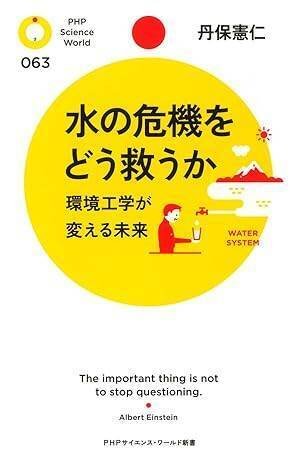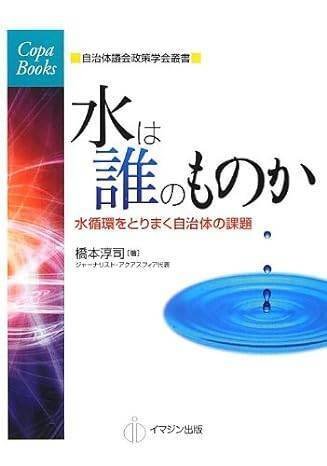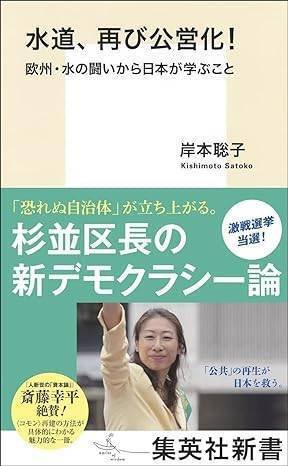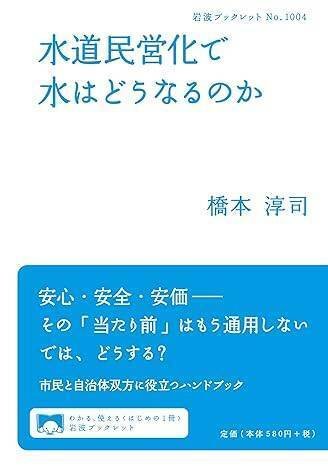
【Random notes】Instantaneous English Composition Training(Book report edition@2023/12/28)
長瀬正太さん撮影
普段、技術英文しか書いていないので、ちょっと気分転換も兼ねて、漫然と気の向くまま(漫文)に、「題目」を設定し、英作文してみました(^^)
ん~英文にした際に、イメージした日本文のニュアンスと異なるなと感じた英文の箇所については、復習も兼ねて、適宜、修正していきたいと考えています( `ー´)ノ
The title:A Century of "Water" Wars
[テキスト]
「「水」戦争の世紀」モード・バーロウ/トニー・クラーク(著)鈴木主税(訳)(集英社新書)

[ Pose a problem ]
When did we start buying water in plastic bottles?
Are you aware of the fact that more than 30 years ago, it was officially reported that "many babies in the Third World are forced to drink Coca-Cola in place of breast milk because they cannot obtain water to dissolve their milk"?
The reason why they cannot get water is because the price of water is too high.
The reason why they are given Coca-Cola is because Coke is cheaper than water.
Of course, any medical professional can tell you that if babies are fed Coke instead of milk from the time they are babies, they will be severely malnourished and protein deficient.
But this is not just a Third World problem.
There are global corporations that think of water as just a commodity and plan to make huge profits from it, and if governments decide to lighten their financial burden by outsourcing water services to private companies, this could come back to haunt us one day.
This is a far more serious situation than the introduction to the book "The Earth's Water is in Danger," which explains the situation with abundant data.
This is truly an indictment of why this is happening.
Earth is called the water planet.
When we look at images of the Earth from the space shuttle, we see water (i.e., oceans) everywhere.
It seems as if water is inexhaustible.
However, this is a terrible mistake.
The amount of drinkable water (fresh water) for human beings is less than 0.5% of the total amount of water on the earth.
Ocean water is undrinkable.
Moreover, this fresh water is rapidly diminishing due to environmental destruction, population growth, urbanization, and industrialization.
For example, it takes 400,000 liters of water to make one car.
It takes a lot of deionized water to make a computer, and it also produces a lot of wastewater.
In Saudi Arabia, where irrigated agriculture was started to become self-sufficient in food, 3,000 tons of groundwater is pumped out to produce one ton of grain, and groundwater (aquifers) will inevitably be depleted in another 50 years.
The world's largest body of fresh water, the Great Lakes in the U.S., has been declining lower and lower every year until finally the St. Lawrence River no longer pours into the Atlantic Ocean.
China's Yellow River has not poured into the ocean since 1972, and in 1997, the number of days it was cut off reached 226.
The Aral Sea, once the world's fourth largest lake, has been used to produce cotton for export, so much so that it has now lost 80% of its total water volume, and the remaining water is now ten times saltier than it used to be.
As a result, fisheries have been decimated, and agriculture has also been destroyed due to the increased temperature fluctuations in the surrounding areas.
This is the current state of the world's freshwater.
[ Conclusion ]
In Japan, there is plenty of freshwater to throw away, but this is extremely rare in the world.
Japan receives a great deal of precipitation, but even so, because the roads are paved, the rain that falls does not percolate underground but pours directly into the ocean.
This means that groundwater cannot be supplied, and the day will come when groundwater will run out, even in Japan.
It is a fact of life that when there is a shortage of something, people and companies will take advantage of it for their business.
The more scarce the commodity is, the more its value increases.
Global corporations, the World Bank, and the IMF realized that freshwater, which is in short supply worldwide, is a more valuable "resource" than oil, and in no time at all, the resource became the subject of speculation and a monopoly.
They are flying around the world trying to buy up all the groundwater and turn it into a commodity.
Here they are relying on the "Washington Consensus," which states that "the whole world has no choice but a free market economy and should follow this economic model.
Indeed, the freshwater crisis is a business opportunity according to the Washington Consensus, and it has set the course for the privatization and commodification of water.
The World Water Forum held in The Hague in 2000 adopted, to the surprise of many, that water is a human necessity but not a right (human right).
The UN and the World Bank adopted it.
Of course, it was global corporations and for-profit water companies that pushed for it.
Since it is a necessity but not a right, those with money and those who pay for it will have access to water, but the poor will not.
That is the principle of economics.
The CEO of a global water company is said to have said the following.
"There is no more efficient product than water. After all, this product is essential for life. Usually you get it for free, but we sell it".
Perhaps he wanted to continue.
"If you can't get water for free, you have to buy our water. If you don't want to die, you have to pay us. No poor man wants to die".
On the other hand, governments that are not financially well-off have decided to privatize expensive water utilities as a solution to their financial problems.
In fact, in many countries, water utilities, which are supposed to be "non-profit public utilities," have been taken over by for-profit foreign companies.
When we hear the words privatization, we tend to simply think, "privatization → competition → price competition → cheaper prices", but that was really naive.
But this was not the case.
In one country, the water supply that is state-run is provided at a low price only to the wealthy citizens, and water is not laid in areas where poor people live.
They are forced to buy water from water vendors who charge 100 times the price.
Even when residents' wells ran dry during the drought in Indonesia, large amounts of water were sprayed on the lawns of golf courses for tourists in the capital city of Jakarta, keeping the grass green.
In France, water rates soared 150% after the privatization of the water utility.
In Bolivia, water rates jumped to 1/5th of monthly income, making it more expensive than the cost of food.
And this is compounded by the manufacturers of bottled water and soft drinks.
The fact that some people cannot afford water is a big business opportunity for them.
They advertised "Don't drink the expensive tap water, drink our mineral water. Drink our soft drinks." and sold it to the poor for less than the price of water.
Thus, babies from poor families had no choice but to quench their thirst by drinking cola instead of water.
We can't worry about our health anymore.
Incidentally, both Pepsi-Cola and Coca-Cola are thinking about a water supply system that will produce cola whenever you turn on the tap, and the technology is said to be easy to implement.
The money-hungry government will eventually grant them the right to install this cola water system.
Water is a necessity but not a right, in other words.
This book is a thorough indictment of these global corporations and the governments and municipalities that follow them.
It considers the common heritage of humanity and common rights as commons (common property), and argues that these (natural resources such as water and air, genes, health, education, culture, traditions, etc.) should not be for sale.
They declare that it is the duty of their generation to pass these on to the next generation.
It proposes that freshwater is not the exclusive property of humans, but is a property shared by all living things.
He then denounces the Washington Consensus as a commodification of this commons and fundamentally wrong.
He then proposes what must be done first to correct this inequality in freshwater supply on a global scale.
[ Comment ]
There was once a manufacturer that applied for a patent on the analyzed human genetic code.
I felt very uncomfortable when I saw that news, but after reading this book, I understood the cause of that discomfort for the first time.
It may be acceptable to patent the technology or machine that reads the genes, but it is fundamentally wrong to patent the genetic code itself.
If we let this discomfort go, air is next.
When fresh water is finally too scarce and too expensive to sell, they will sell air.
This is the ultimate commodity.
If any of you are thinking, "Air is everywhere, so how can it be for sale?" If you are thinking, "Air is everywhere, so it can't be a product," you are naive.
Selling something that can be sold is not business, but doing business with something that is not for sale is where money blooms.
It is too late for the World Bank to suddenly declare "Air is a necessity for survival, but not a human right".
【参考図書】
「文明の中の水 人類最大の“資源”をめぐる一万年史」湯浅赳男(著)

「図解でわかる 14歳からの水と環境問題」インフォビジュアル研究所(著)

「水の危機をどう救うか」(PHPサイエンス・ワールド新書)丹保憲仁(著)

「地球はなぜ「水の惑星」なのか 水の「起源・分布・循環」から読み解く地球史」(ブルーバックス)唐戸俊一郎(著)

「生命にとって水とは何か―水の不思議な力を解き明かす」(ブルーバックス)中村運(著)

「水とはなにか―ミクロに見たそのふるまい〈新装版〉」(ブルーバックス)上平恒(著)

「見えない巨大水脈 地下水の科学 使えばすぐには戻らない「意外な希少資源」」(ブルーバックス)日本地下水学会/井田徹治(著)

「生命からみた水」(未来の生物科学シリーズ)上平恒(著)

「水は誰のものか―水循環をとりまく自治体の課題」(自治体議会政策学会叢書/Copa Books)橋本淳司(著)自治体議会政策学会(読み手)

「水道、再び公営化! 欧州・水の闘いから日本が学ぶこと」(集英社新書)岸本聡子(著)

「水道民営化で水はどうなるのか」(岩波ブックレット)橋本淳司(著)

「百姓たちの水資源戦争 江戸時代の水争いを追う」渡辺尚志(著)

「水は答えを知っている」(サンマーク文庫)江本勝(著)

「「水」に価値がついた日――おいしい水から機能をもつ水へ」森澤紳勝(著)

【関連記事】
【Random notes】Instantaneous English Composition Training(Diary Edition@2023/12/21)
https://note.com/bax36410/n/na300148fa075
【Random notes】Instantaneous English Composition Training(Business Skills edition@2023/12/22)
https://note.com/bax36410/n/n98d9866425fe
【Random notes】Instantaneous English Composition Training(Book report edition@2023/12/23)
https://note.com/bax36410/n/n7ba9fcf73cf7
【Random notes】Instantaneous English Composition Training(Book report and Translation edition@2023/12/24)
https://note.com/bax36410/n/n1129bcac9b0e
【Random notes】Instantaneous English Composition Training(Diary and Translation edition@2023/12/25)
https://note.com/bax36410/n/n366840f35f42
【Random notes】Instantaneous English Composition Training(Diary Edition@2023/12/26)
https://note.com/bax36410/n/nedd3dc8bf4e0
【Random notes】Instantaneous English Composition Training(Diary Edition@2023/12/27)
https://note.com/bax36410/n/n13142d2060b5
【Random notes】Instantaneous English Composition Training(Diary Edition@2023/12/29)
https://note.com/bax36410/n/n5547f7c94895
【Random notes】Instantaneous English Composition Training(Diary and Translation edition@2023/12/30)
https://note.com/bax36410/n/nb1973f862804
【大晦日カウントダウン記事(8:00)】【Random notes】Instantaneous English Composition Training(Diary and Translation edition@2023/12/31)
https://note.com/bax36410/n/nca008f31193c
この記事が気に入ったらサポートをしてみませんか?
